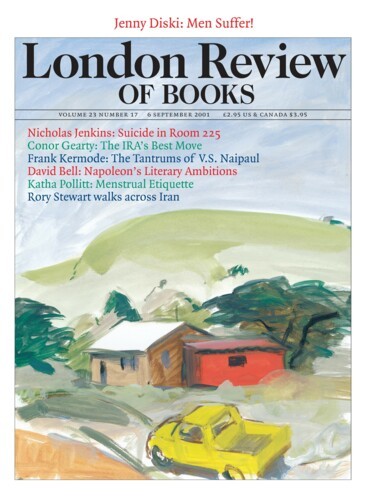He looks eerily young,
what’s left of him,
purged, somehow, back into boyhood.
It is difficult not to watch
the movie on TV at the foot of his bed,
40ll colour screen,
a jailhouse dolly psychodrama:
truncheons and dirty shower scenes.
I recognise one of the actresses,
now a famous lesbian,
clearly an early B-movie role.
The black nurse says ‘Oh dear’
during the beatings.
– TV in this town is crap, he says.
His voice is very faint.
He leans towards me,
sliding further and further,
until the nurse has to straighten him out,
scolding him gently.
He reaches out for my hand.
The sudden intimacy rattles me.
He is telling a story.
Two, actually,
and at some point they blend together.
There are rivers and trains,
Oxford and a town near Hamburg.
Also, the night train to Milan
and a lovely Italian breakfast.
The river in Oxford –
he can’t remember the name;
but the birds and fritillaries in bloom . . .
He remembers the purple flowers
and a plate of gingerbread cookies
set out at one of the colleges.
He gasps to remember those cookies.
How surprised he must have been
by the largesse,
and hungry, too.
– He’s drifting in and out;
I can hear the nurse
on the phone from the other room.
He has been remembering Europe for me.
Exhausted, he lies quiet for a time.
– There’s nothing better than a good pee,
he says and begins to fade.
He seems very close to death.
Perhaps in a moment, perhaps a week.
Then awakes.
Every patch of story, no matter how fuddled,
resolves into a drollery.
He will perish, I imagine,
en route to a drollery.
Although his poems,
little kinetic snapshots of trees and light,
so denuded of personality
and delicately made
that irony of any sort
would stand out
like a pile of steaming cow flop
on a parquet floor.
We are in a great metropolis
that rises heroically from the American prairie:
a baronial home,
the finest of neighbourhoods,
its broad streets nearly empty
on a Saturday afternoon,
here and there a redbud in bloom.
Even in health,
a man so modest and soft-spoken
as to be invisible
among others, in a room of almost any size.
It was, I think, a kind of hardship.
– Have you met what’s-his-name yet?
he asks.
You know who I mean,
the bigshot.
– Yes, I tell him, I have.
– You know that poem of his?
Everyone knows that poem
where he’s sitting indoors by the fire
and it’s snowing outside
and he suddenly feels a snowflake
on his wrist?
He pauses and begins to nod off.
I remember now the name of the river
he was after, the Cherwell,
with its naked dons, the Parson’s Pleasure.
There’s a fiercesome cat-fight
on the TV, with blondie catching hell
from the chicana.
He comes round again and turns to me,
leaning close,
– Well, of course, he says,
taking my hand,
his eyes narrowing with malice and delight:
– That’s not going to be just any old snowflake,
now, is it?
Send Letters To:
The Editor
London Review of Books,
28 Little Russell Street
London, WC1A 2HN
letters@lrb.co.uk
Please include name, address, and a telephone number.

